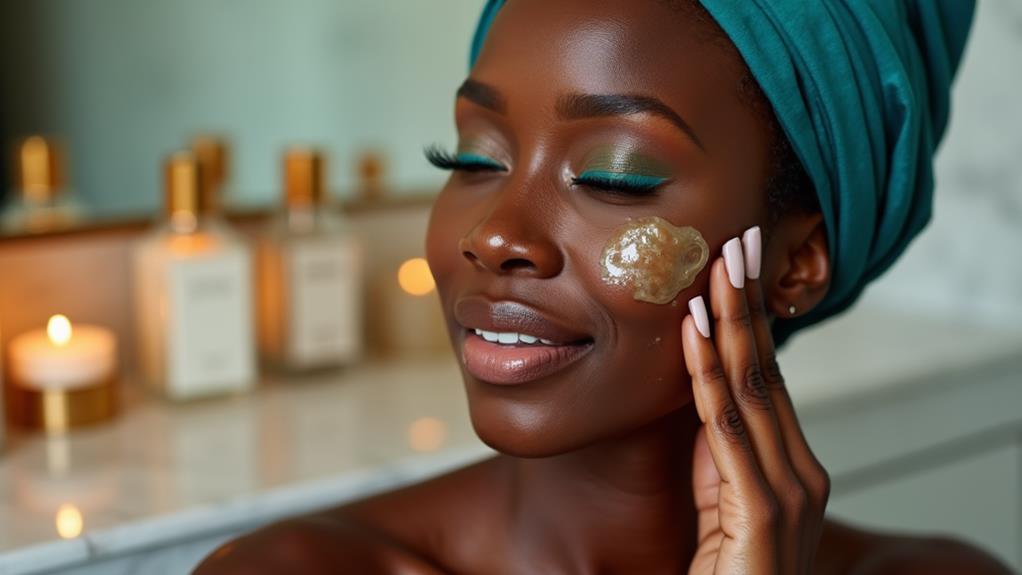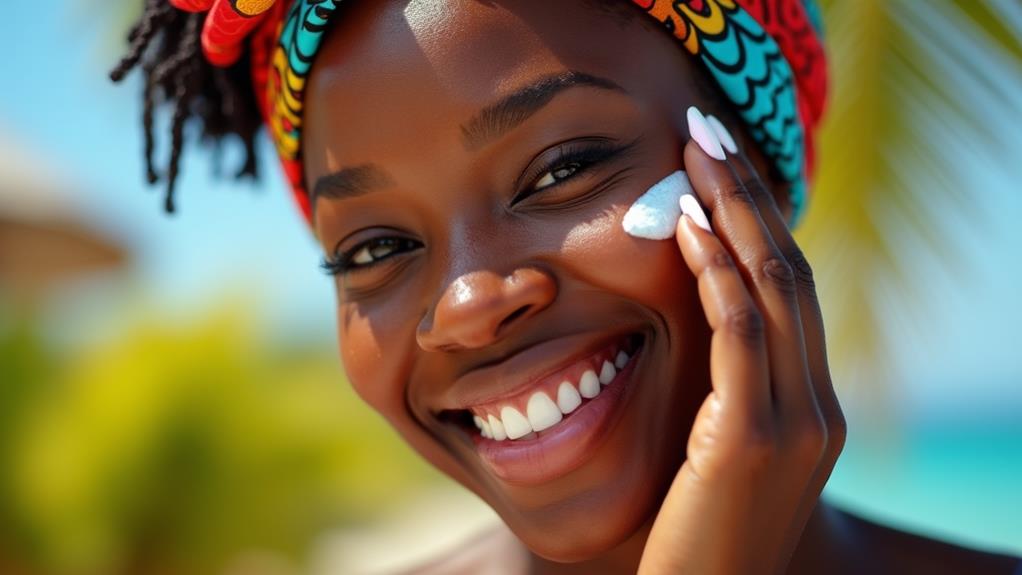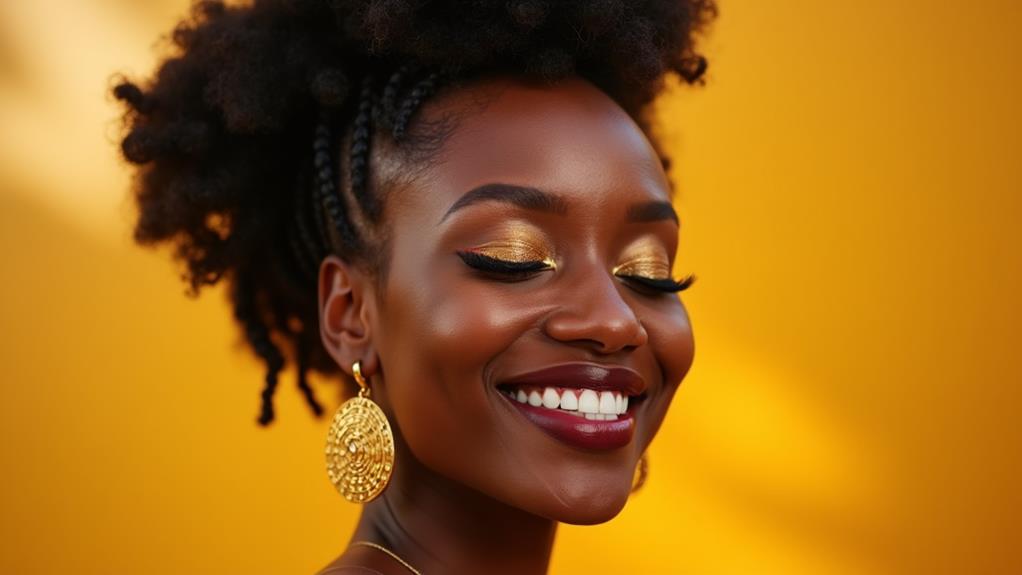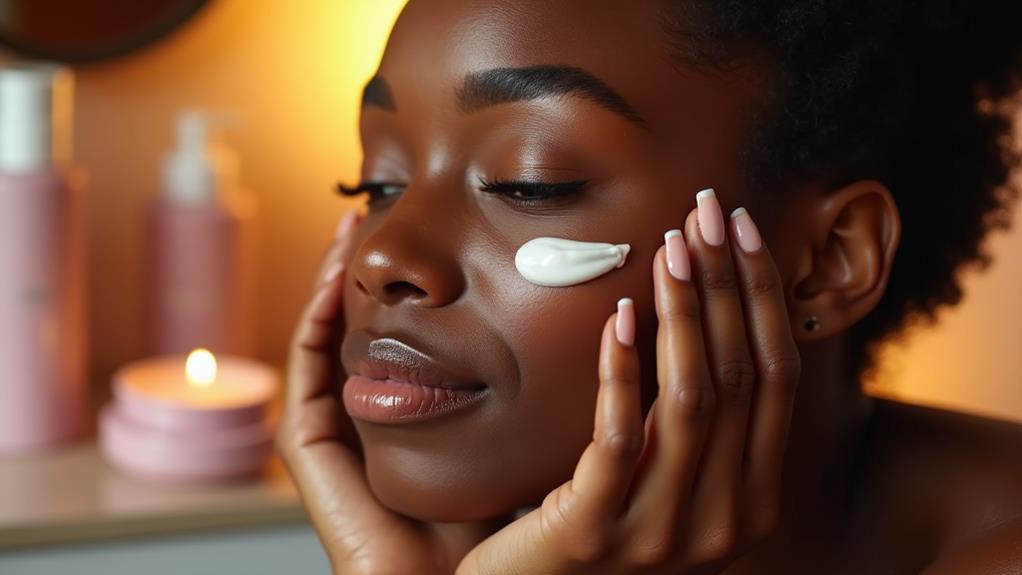Just as you've been searching for an all-encompassing beauty routine, we have compiled the ultimate guide for Black women's skincare and haircare. You'll find that this routine isn't just about looking good; it's about celebrating your unique features and addressing specific concerns. From gentle cleansing techniques that respect melanin-rich skin to protective styling methods that nurture textured hair, we have you taken care of. But there's more to this routine than meets the eye. What secret ingredients and time-tested techniques might transform your daily regimen? The answers lie ahead, promising to revolutionize the way you care for your skin and hair.
Cleansing for Melanin-Rich Skin

A gentle touch is key when cleansing melanin-rich skin. Your beautiful complexion requires care tailored to its unique needs.
Start by selecting a cleanser that's free from harsh sulfates and fragrances, as these can strip your skin of its natural oils and lead to dryness or irritation.
Consider incorporating cleansing oils into your routine. These are excellent for dissolving makeup and impurities without disrupting your skin's delicate balance. Massage the oil into your skin using circular motions, then rinse with lukewarm water.
Gentle exfoliation is essential for maintaining a healthy glow, but be cautious not to overdo it. Opt for chemical exfoliants like alpha-hydroxy acids (AHAs) or beta-hydroxy acids (BHAs) instead of harsh physical scrubs. Use these products 1-2 times a week to avoid over-exfoliation, which can cause hyperpigmentation.
After cleansing, always follow up with a hydrating toner and moisturizer to lock in hydration.
Toning and Balancing
While cleansing lays the foundation for healthy skin, toning and balancing are essential next steps in your beauty routine. For melanin-rich skin, these steps help regulate oil production, tighten pores, and prepare your skin to better absorb subsequent products.
When choosing a toner, opt for alcohol-free formulas that won't strip your skin of its natural oils. Look for ingredients like witch hazel, rosewater, or glycerin, which can help balance your skin's pH levels without causing irritation. Apply your toner with clean hands or a cotton pad, gently patting it into your skin rather than rubbing.
Balancing oils are particularly beneficial for Black skin, which tends to be naturally drier. Consider incorporating facial oils like jojoba, argan, or marula into your routine. These oils can help regulate sebum production and provide deep hydration without clogging pores.
Toning techniques like facial massage or gua sha can also enhance your routine, promoting lymphatic drainage and improving circulation. Remember to use gentle, upward strokes to avoid pulling on your skin.
Consistency is key in toning and balancing, so make these steps a regular part of your daily skincare regimen.
Tackling Hyperpigmentation

Hyperpigmentation, a common concern for Black women, can be effectively addressed with the right approach and products. Understanding the causes of hyperpigmentation, including sun exposure, hormonal influences, and inflammation, is vital for developing an effective treatment plan.
Various treatment options are available, ranging from over-the-counter skincare ingredients to professional treatments.
Key skincare ingredients to look for include vitamin C, niacinamide, kojic acid, and alpha-hydroxy acids. These help to fade dark spots and even out skin tone. Layering products effectively and maintaining consistency in your routine is essential for ideal results.
Don't forget to incorporate lifestyle factors, such as sun protection and a balanced diet rich in antioxidants, which can have a significant impact on your skin's health.
For more stubborn cases, consider professional treatments like chemical peels or microdermabrasion. Natural remedies, such as aloe vera and licorice extract, can also be beneficial.
Remember that tackling hyperpigmentation is a gradual process, and patience is key. By combining the right products, treatments, and lifestyle habits, you'll be on your way to achieving a more even and radiant complexion.
Moisturizing Dry Skin
Why does dry skin seem to be such a common concern for Black women? The answer lies in our skin's unique structure. Melanin-rich skin tends to lose moisture more quickly, making it prone to dryness and flakiness.
But don't worry – with the right hydration techniques, you can keep your skin supple and glowing year-round.
Start by incorporating a rich, nourishing moisturizer into your daily routine. Look for ingredients like hyaluronic acid, glycerin, and ceramides, which help lock in moisture.
Don't forget to hydrate from within by drinking plenty of water throughout the day.
Seasonal adjustments are essential for maintaining ideal skin hydration. In colder months, switch to a heavier cream and consider using a humidifier to combat dry indoor air.
During summer, opt for lighter, non-comedogenic formulas that won't clog your pores.
For an extra boost of hydration, try incorporating a weekly moisturizing mask or facial oil into your routine.
Remember to pay special attention to often-overlooked areas like your neck, hands, and feet.
With consistent care and the right products, you'll be well on your way to achieving and maintaining beautifully moisturized skin.
Sun Protection Essentials

Despite common misconceptions, Black skin needs sun protection just as much as any other skin type. While melanin offers some natural defense, it's not enough to prevent sun damage, premature aging, and skin cancer. That's why incorporating sunscreen into your daily routine is vital.
When choosing sunscreen, opt for broad-spectrum protection with an SPF of at least 30. There are two main sunscreen types: chemical and physical. Chemical sunscreens absorb UV rays, while physical (or mineral) sunscreens reflect them. Many Black women prefer physical sunscreens containing zinc oxide or titanium dioxide, as they're less likely to leave a white cast on darker skin tones.
For daily application, apply sunscreen as the last step in your morning skincare routine, before makeup. Don't forget often-neglected areas like your ears, neck, and hands.
Reapply every two hours when outdoors or after swimming or sweating. Remember, sun protection isn't just for beach days – it's essential year-round, even on cloudy days or when you're indoors near windows.
Natural Hair Care Basics
As more Black women embrace their natural hair texture, understanding proper care techniques becomes vital. Your journey to healthy, beautiful natural hair starts with prioritizing scalp health. Regularly cleanse and moisturize your scalp to prevent buildup and promote hair growth. Choose sulfate-free shampoos and conditioners specifically formulated for your hair type.
Moisture is key for maintaining curl definition and preventing breakage. Implement a deep conditioning routine using products rich in natural oils and butters. The LOC (Liquid, Oil, Cream) or LCO (Liquid, Cream, Oil) methods can help lock in moisture and define your curls.
Don't forget to protect your hair at night with a satin or silk bonnet or pillowcase.
Gentle detangling is essential to prevent damage. Use your fingers or a wide-tooth comb, starting from the ends and working your way up. Avoid excessive heat styling, opting for protective styles when possible.
Trim your ends regularly to maintain healthy hair and promote growth. Remember, everyone's hair is unique, so be patient as you discover what works best for your natural texture.
Protective Styling Techniques

Protective styling is a cornerstone of natural hair care, offering a way to shield your strands from environmental stressors and daily manipulation. These styles, including braids, twists, and updos, can help retain moisture, prevent breakage, and promote length retention.
When opting for protective styles, it's essential to prioritize scalp health. Verify your scalp is clean and moisturized before installation, and maintain this care throughout the style's duration.
For braid maintenance, use a lightweight oil on your scalp and hair to prevent dryness and reduce frizz.
Choose styles that don't put excessive tension on your hairline to avoid traction alopecia. Rotate your protective styles and give your hair breaks between installations to allow for thorough cleansing and conditioning.
Makeup Tips for Dark Skin
Finding the right makeup for dark skin tones can be a game-changer in your beauty routine. The key is to start with a solid foundation selection that matches your unique undertone. Look for brands that offer a wide range of shades specifically formulated for darker complexions. When testing foundation, always check the color match in natural light for the most accurate results.
For a radiant glow, highlighter application is essential. Opt for gold, bronze, or copper-toned highlighters that complement your skin's warmth. Apply to the high points of your face: cheekbones, bridge of the nose, and cupid's bow.
For eye makeup, don't be afraid to experiment with bold, vibrant colors that pop against your skin tone. Deep purples, rich blues, and warm oranges can create stunning looks.
When choosing blush, opt for deeper shades like berry or plum for a natural flush. For lips, nude shades with warm undertones work well, but don't shy away from bold reds or deep burgundies for a statement look.
Nighttime Skincare Routine

A solid nighttime skincare routine is essential for maintaining healthy, radiant skin. As a Black woman, your evening regimen should focus on hydration, protection, and repair.
Start by thoroughly removing makeup and cleansing your face with a gentle, non-stripping cleanser. Follow with an alcohol-free toner to balance your skin's pH levels.
Next, apply a night serum rich in antioxidants and hydrating ingredients like hyaluronic acid or niacinamide. These powerful actives work to repair and rejuvenate your skin while you sleep.
For an extra boost of moisture, layer on a lightweight moisturizer suitable for your skin type.
Don't forget to pay attention to the delicate eye area. Use a nourishing eye cream to combat dark circles and fine lines.
Once or twice a week, incorporate a sleep mask into your routine. These overnight treatments provide intensive hydration and can help address specific skin concerns like hyperpigmentation or uneven texture.
Body Care and Exfoliation
Three key steps in body care for Black women include cleansing, exfoliating, and moisturizing.
When it comes to exfoliation methods, body scrubs are essential for removing dead skin cells and promoting a healthy glow. Opt for gentle exfoliants with natural ingredients like sugar or coffee grounds, especially if you have sensitive skin. DIY recipes can be a great option, allowing you to customize your scrub with nourishing oils and herbs.
Exfoliation frequency depends on your skin type, but once or twice a week is generally sufficient. Remember to make seasonal adjustments, as your skin's needs may change throughout the year.
After exfoliating, focus on hydration techniques to lock in moisture. Body oils are excellent for this purpose, providing deep nourishment and leaving your skin silky smooth.
For product recommendations, look for items specifically formulated for melanin-rich skin. Many brands now offer lines tailored to Black women's unique skincare needs.
When selecting products, prioritize those with natural ingredients that support your skin's health and radiance. By incorporating these practices into your routine, you'll maintain beautiful, well-nourished skin from head to toe.
Conclusion
As you navigate your beauty journey, remember you're tending a unique garden. Your skin is fertile soil, your hair a vibrant crown. Nourish them with care, protect them from harsh elements, and watch them flourish. You're not just following a routine; you're cultivating your natural radiance. Embrace each step as an act of self-love, knowing that your beauty routine is a celebration of your heritage and individuality. You're blooming into your most authentic self.


